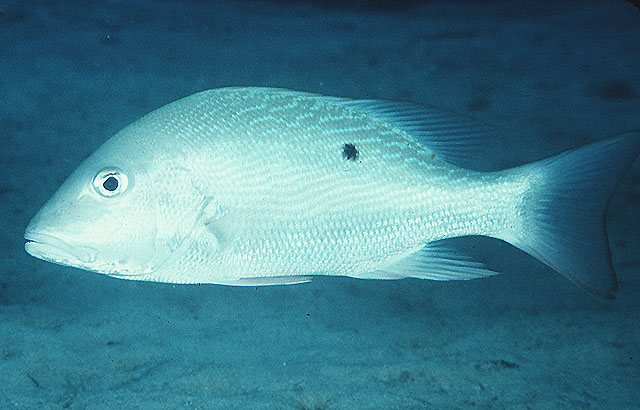| Lutjanidae (Snappers), subfamily: Lutjaninae |
| 94 cm TL (male/unsexed); max.weight: 16 kg; max. reported age: 29 years |
|
reef-associated; depth range 25 - 95 m |
| Western Atlantic: Massachusetts, USA and Bermuda (Anderson, pers. comm.) to southeastern Brazil, including the Caribbean Sea and the Gulf of Mexico (Ref. 9626). Most abundant around the Antilles, the Bahamas and off southern Florida. |
|
Dorsal spines (total): 10-11; Dorsal soft rays (total): 13-14; Anal spines: 3-3; Anal soft rays: 7-8. Preopercular notch and knob weak. Pectoral fins are long, reaching level of anus. Scale rows on back rising obliquely above lateral line. Back and upper sides olive green, whitish with a red tinge on lower sides and belly. A black spot is on the upper back just above the lateral line and below the anterior dorsal fin rays. A pair of blue stripes runs on the snout-cheek region, the upper continuing behind eye to upper opercle edge. |
| Adults occur in continental shelf areas as well as clear waters around islands (Ref. 5217). Large adults usually among rocks and coral while juveniles occur over sandy, vegetated (usually Thalassia) bottoms (Ref. 5217). They form small aggregations which disband during the night (Ref. 55). Feed both day and night on fishes, shrimps, crabs, cephalopods, and gastropods (Ref. 55). Flesh considered good quality (Ref. 55). Marketed mainly fresh or frozen (Ref. 55). Traded as an aquarium fish at Clara, Brazil (Ref. 49392). |
|
Near Threatened
(Ref. 96402)
|
| reports of ciguatera poisoning |
|
Source and more info: www.fishbase.org. For personal, classroom, and other internal use only. Not for publication.
Page created by Jen, 05.08.02,
php script by kbanasihan 06/09/2010 ,
last modified by
dsantos, 20/08/10

